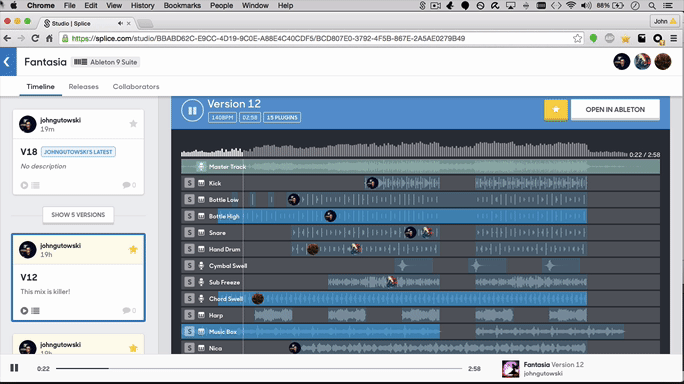Splice Studio V2, Cubase Goes Cloud
11 Dec 2015
In a previous post I wrote about Splice, a social music collaboration platform. (Blend, a recent Roli acquisition, Kompoz, and BandLab are a few others.)
Late last week Splice announced version 2 of their Splice Studio app. One of the big features of the v2 update is support for audio-only projects. This is a feature that Blend already supports and is a welcome addition to Splice. For one, this opens Splice up to users whose DAWs aren't supported. (The supported list currently includes Ableton Live, FL Studio, Logic Pro, and GarageBand) And it also means that collaborators don't need to be using the same DAW software to work on a project together.
The new version also enables commenting on a project directly from the timeline view, which looks quite nice. Further, the announcement states that timeline commenting is available on both desktop browsers and mobile devices. Having a responsive UI (which I'm presuming this is since there was no mention of native mobile apps in the post) that works well on mobile devices certainly adds to the convenience of the platform and allows users to comment on projects from pretty much anywhere. I haven't used Splice or Blend (my two favorites of the music collaboration platforms) extensively, but a good mobile experience could set the two apart.
 Commenting directly from timeline in Splice Studio v2.
Commenting directly from timeline in Splice Studio v2.
Right around the time of the Splice Studio v2 update announcement, Steinberg released v8.5 of Cubase and got themselves into the cloud collaboration space with the unveiling of VST Transit. Here's what Steinberg has to say about it:
"Cubase in the cloud! With its innovative, DAW-centric approach to web-based musical collaboration, VST Transit can revolutionize production workflows shared between musicians or band members."
The video below has some more details.
Obviously this is only available within Cubase, thus the pool of collaborators is limited to other Cubase users. But it's interesting to contrast the approach taken by Splice and other cloud native collaboration platforms vs building collaboration tools embedded within DAWs themselves as Steinberg has done with VST Transit. The cloud native (Splice, Blend, etc.) model enables support across a wide variety of DAWs while native integration within a DAW potentially affords a more powerful and streamlined experience since the collaboration features are built into the DAW itself.
It's interesting to note that Steinberg also develops Cubasis, one of the stronger iOS DAWs available. (The newly released Auria Pro is another top DAW app for iOS.) I'm really curious to see if Steinberg extends elements of VST Transit and makes it available in some form to both desktop and iOS users via Cubase and Cubasis. This would open VST Transit up to a larger pool of users and help Steinberg learn more about how mobile could fit into a modern, distributed DAW ecosystem. It certainly makes me wonder if the folks at Steinberg have a longer-term strategy in mind. Or maybe there's no master plan and their mobile and desktop technologies will evolve entirely separately.
And then there's Bitwig. Online collaboration is one of the forward-looking features called out in the off-in-the-distance version 2. It'll be interesting to see how they approach the feature when they get around to working on it and also to see how the space evolves in the meantime.
From Bitwig's site on their vision for forthcoming features:
Soon the ability to collaborate on projects in real-time will open from those working next to you, to your friends connected online around the world. Bitwig Studio will make it easy for you to work on ideas with others, wherever they might be. The multi-user online collaboration feature means music production over the internet. Multiple users can compose music in the same project from different locations, while Bitwig Studio keeps everything and everyone in sync.
For now, Splice, Blend, and others are proof that there's a lot of interest in social music platforms. And while, as far as I know, Cubase is the first DAW to provide native support for collaboration features, I wouldn't be surprised to see more DAW developers start to explore similar features built directly within their DAWs, too.